By Linus Höller, Northwestern University
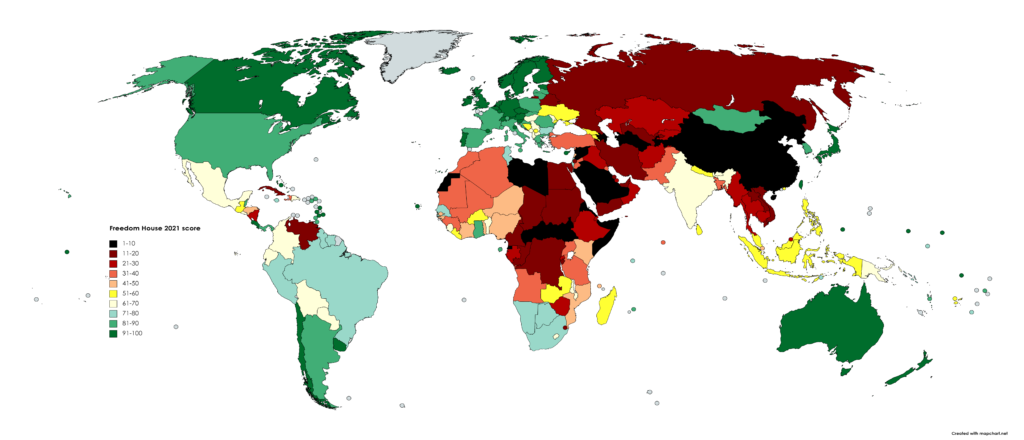
In the most unusual year of the current millennium, democracy and freedoms around the world suffered at an unprecedented level. This becomes apparent from two much-anticipated reports on the status of freedoms in the world, published by Freedom House and the Economist’s Intelligence Unit.
Freedom House’s annual “Freedom in the World” report evaluates countries’ political rights and civil liberties, assigning them scores for both as well as an aggregate score.
Africa and Asia remain home to some of the most restrictive countries in the world. Syria, South Sudan, Eritrea, Turkmenistan and North Korea fall at the very bottom of the list (in that order), while the top-scoring countries are Finland, Norway, Sweden, New Zealand, the Netherlands, Uruguay and Canada.
While the number of countries that saw declines in their freedom has exceeded the ones that saw improvements for every year since 2006, last year that difference was the greatest yet: While 28 countries improved, 73 worsened their scores.
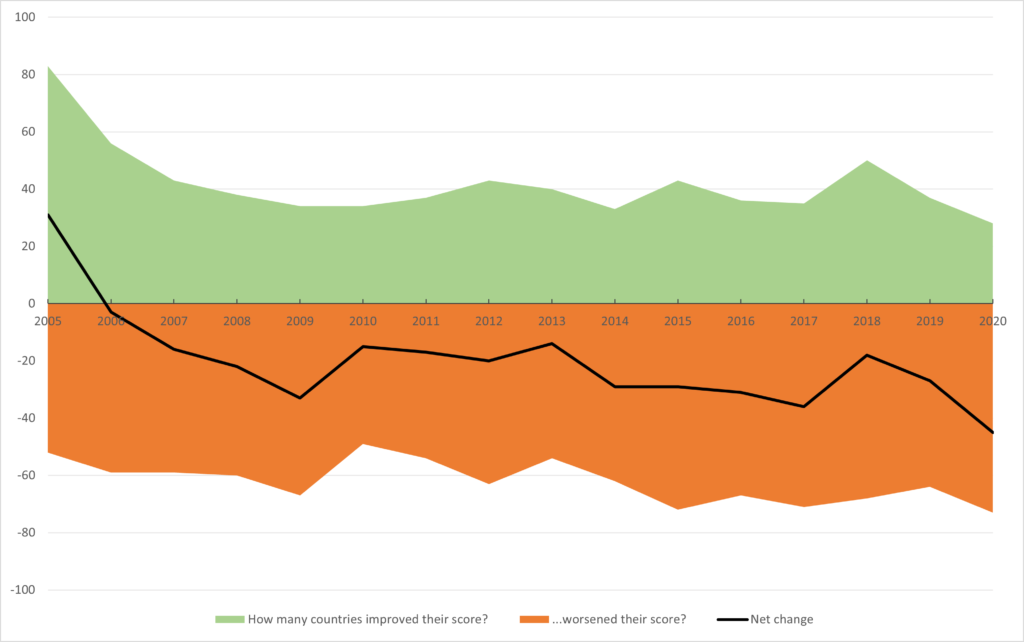
With freedoms eroding globally, the trend has increasingly started affecting “western” countries with established democracies as well – brought on by increasing populism and nationalist, populist leaders being elected in major global democracies, including the U.S. The majority of countries seeing declines over the last years is still located in Africa, as is the one that saw the worst decrease over the past decade – Mali, which has lost 39 points. However, Europe has seen some troubling trends as well, most notably in Hungary, an EU member, which has seen a precipitous decline of 21 points under Viktor Orbán’s rule, making it the first and only EU country to slide from “free” to “partly free” in Freedom House’s classification. Poland, also an EU member, has registered a decline of 11 points under the similarly nationalist rule of the “Law and Justice” party PiS. The two countries have often worked in tandem to block the EU from sanctioning their antidemocratic actions.
Perhaps most striking is the decline of the United States by 11 points over the same period of time. A myriad of factors played into this, ranging from corruption and lacking transparency in government to voter suppression, inhumane treatment of refugees, police brutality and others. In 2020, the United States’ score, 83, was the same as Monaco (a principiality) and considerably worse than most of Europe, including most of post-communist eastern Europe.

Similar to Freedom House, the Economist found in their “Democracy Index” report that “global democracy [had] a very bad year.” Their classification breaks countries into four groups, ranging from “full democracy” to “authoritarian regime.” In 2020, only 8.4% of the global population that found themselves in countries assessed by the index lived in full democracies. 50.6% lived in authoritarian or hybrid regimes.
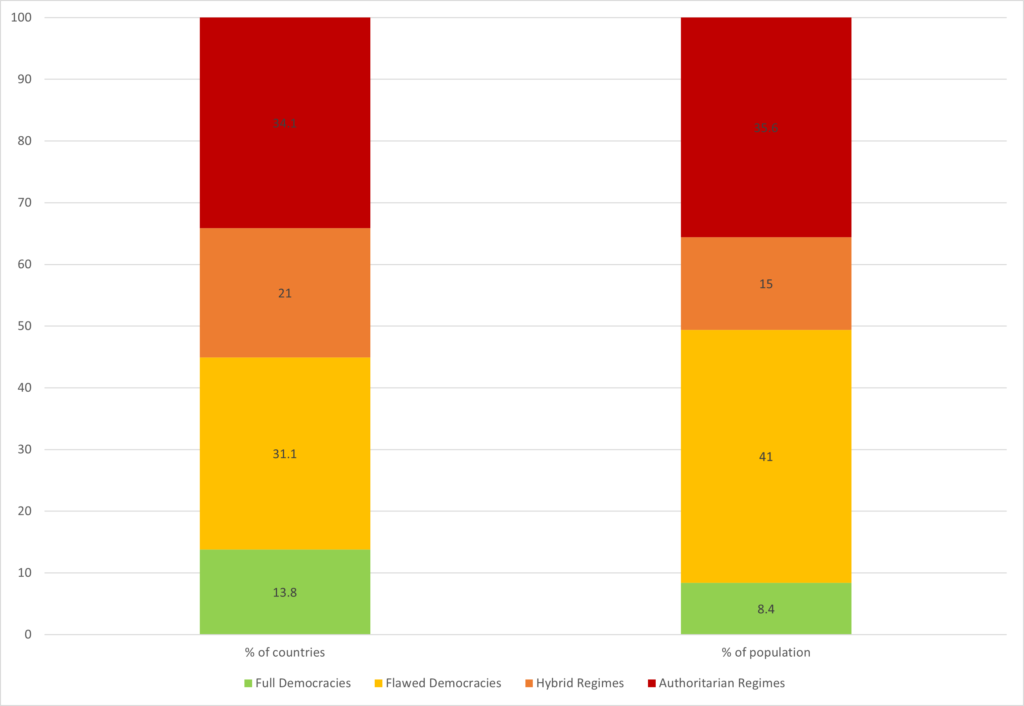
Global democracy remains particularly weak in Africa, where most countries are considered undemocratic or flawed democracies at best. Central Asia and China play a significant role in boosting the population numbers of the non-democratic countries, too. The United States and a number of European countries are considered flawed democracies. The Scandinavian countries, Canada, New Zealand and, to a lesser extent, central Europe lead the pack in terms of democracy.
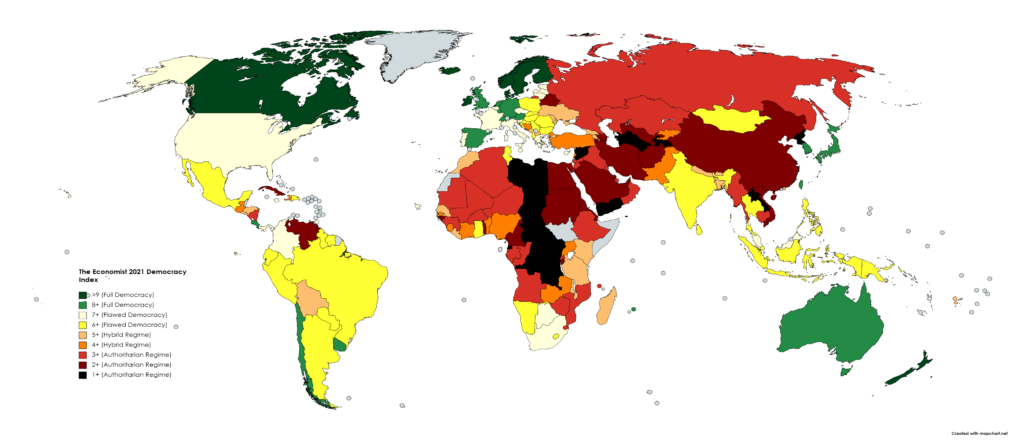
The United States’ Democracy in Decline
Often touting itself as the “leader of the free world,” the U.S. has been among the 25 countries with the most significant drops in freedom according to Freedom House’s scale. Losing a total of 11 points, it has slipped in both political rights and civil liberties, a trend that began in the early 2010s, accelerating in the middle of the decade and significantly picking up pace during the Trump administration.
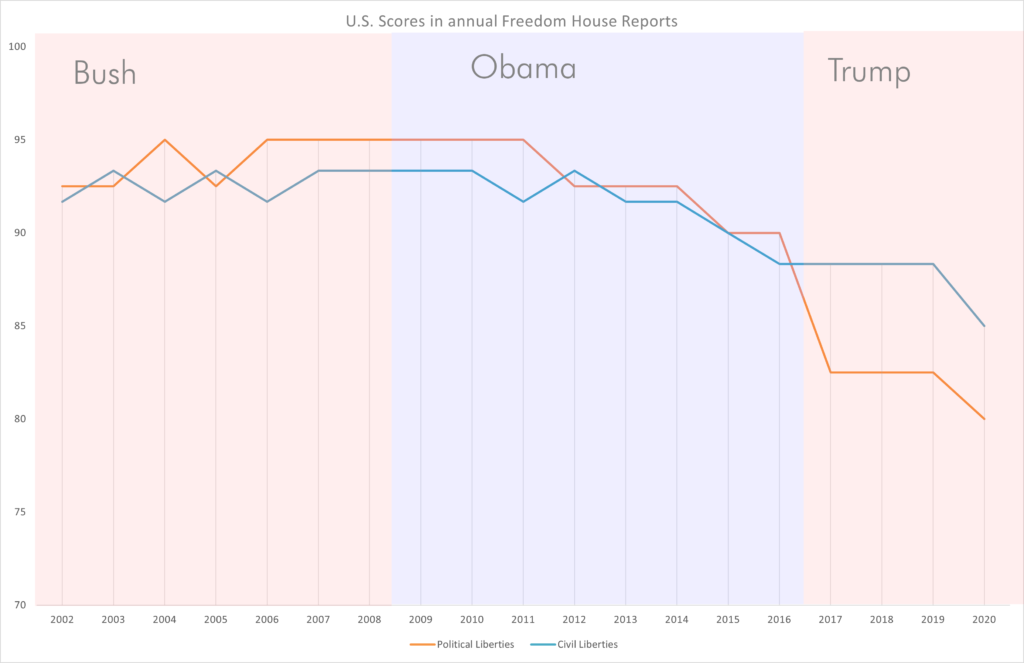
Although not included in the 2020 ranking because it took place just after the turn of the new year, the riot at the Capitol in Washington D.C. on January 6 of this year made painfully clear some of the aspects that contributed to America’s decline in the rankings. President Trump had used inflammatory and anti-democratic speech since his campaign trail, backing it up through similar actions once he was in office – using his position for personal enrichment, condoning non-democratic acts, and playing out countless of his authoritarian tendencies. The riot showed the extent to which his followers had been affected by his message and the damage it had done on the American democracy – the sitting president attempted to overturn a legitimate, valid and fair election through use of force. It also showed the role that the GOP played in allowing this erosion and undermining of the USA’s democracy to go forward – following the attack, there was almost no pushback from the Republican party, with many elected officials scrambling to defend the outgoing president.
Before that, 2020 had already brought an all-time low in terms of the United States’ political and civil liberties, in a year that was characterized not just by the cutbacks of civil liberties to combat the pandemic but also saw the continuation of Trump’s attacks on the American democracy as well as wide-spread civil unrest in the summer. Protests caused by police brutality were met by police brutality and the pre-emptive deployment of national guard troops, declaring of curfews and closing off of public spaces called into question the principle of freedom of assembly.
An interactive graph showing the U.S. performance in the different metrics of the Economist’s Democracy Index.
In the U.S. and globally, 2020 has set new lows for democracy and freedoms. However, the data shows that it only continued and exacerbated a trend that has started years ago. The root of the problem lies not in the exceptionally of 2020, but rather, in the dangerously shifting political norms and landscapes of our modern world.


